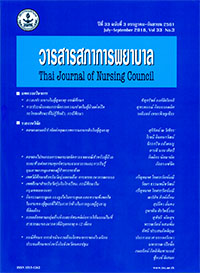Sex Education for Adolescents in School: A Case Study in Bangkok
Keywords:
school-based sex education, adolescents, case studyAbstract
Objective: To explore students’ needs for information on sex education, teachers’
and school administrators’ opinions on sex education for adolescents in school, and parents’
or caregivers’ attitudes towards adolescents’ sexual behaviors and sex education.
Design: Descriptive research.
Procedure: Quantitative and qualitative data were collected from three groups of
participants in two public secondary schools in Bangkok. The frst group (262 seventhand eighth-graders) completed the Needs for Sex Education Information questionnaire.
The second group (the students’ parents or guardians, totalling 227), responded to the
Attitudes towards Adolescents’ Sexual Behaviours and Sex Education questionnaire.
The third group (eight teachers and school administrators) participated in a semi-structured
interview. Descriptive statistics were used for quantitative data analysis, and content
analysis for the qualitative data.
Results: More than half of the students stated that they wanted their school to
increase the contents of sex education, particularly on pregnancy prevention and birth control,
decision-making and refusal skills, and sexually transmitted diseases. Teachers and school
administrators viewed sex education as a good approach to sexual risk prevention in
adolescents, and also identifed major limitations of the current sex education, which
included teachers’ lack of knowledge and skills, inadequate time, and absence of proper
teaching media. Effective school-based sex education should start at grades 4-6, along
with adjustment of its contents to meet the students’ needs and ongoing development of
teachers’ skills in giving sex education. Moreover, most of the parents or guardians
had positive attitudes towards sex education and realised that they should have a role in
teaching sex education to their adolescent children.
Recommendations: Teachers should be trained to improve their skills in giving
integrated, comprehensive sex education. Good communication between parents/
guardians and schools’ personnel should be established to enhance their collaboration
in teaching sex education. Further studies should focus on research and development
of school-based sex education models that can be applied to students at all levels.
Downloads
References
2. Surngsri, S. The determine of the resilience factors and risk taking behaviors on sexual intercourse among
secondary school students in extended opportunity educational schools in Chonburi province. The Journal of Baromarajonani College of Nusing, Nakhonratchasima 2015;21(2):17-26. (in Thai)
3. Yingyong T, Seenor W, Chantaramanee S, Punsuwan N. The behavioral surveillance survey of student groups in Thailand, 2017. Nonthaburi: Bureau of Epidemiology, Department of Disease Control, Ministry of Public Health; 2018. (in Thai)
4. Sukrat B, Aeamkong P. Statistics on adolescent births, Thailand 2015. Bangkok: The Agricultural Cooperative Federation of Thailand; 2017. (in Thai)
5. AIDS, Tuberculosis, and Sexually Transmitted Diseases Control Division, Health Department, Bangkok Metropolitan. Report of HIV sentinel surveillance in Bangkok, 2016. Nonthaburi: Thanapornpanit; 2017. (in Thai)
6. Thepthien B, Srivanichakorn S, Chucharoen P. The behavioral surveillance survey of 9 target groups in Bangkok, 2015. Nakhon Pathom: ASEAN Institute for Health Development, Mahidol University; 2015. (in Thai)
7. Boonmongkon P, Pormnat P, Samoh N, Ojanen T, Guadamuz T, Burford J, et al. Research report on review of sexuality education in Thai schools. Bangkok: UNICEF Thailand; 2016. (in Thai)
8. Sukityan P. Sex education learning management based on the Trisikkha Principle (The Three-Fold Principles) for reducing risky sexual behaviors concerning practice students. Journal of Education Studies 2016;44(2):119-32. (in Thai)
9. Adultrakul A, Potjanamart C, SawangJaiThum K. Effects of problem based learning towards knowledge on sex education and opinions on sex risk behaviors among Mutthayomsuksa students. Nursing Journal 2015;42(Suppl Dec.):46-56. (in Thai)
10. Phoorisri T, Mararat A, Onnmong P. AIDS and sex education learning management model for secondary school students. Disease Control Journal 2015; 41(4):241-52. (in Thai)
11. Ruanjan S. Approach development by learning sex education for secondary school teachers to prevent teenage pregnancy in Uttaradit province. Phetchabun Rajabhat Journal 2014;16(1):93-100. (in Thai)
12. Bualoy W, Therawiwat M, Vathanasomborn P, Imamee N. Effectiveness of a sex education program to prevent sexual risk behaviors on grade 8 students,Sampran district, Nakhon Pathom province. Rama Nurs J 2014;20(1):127-42. (in Thai)
13. Ruanjan S. The situation of sexual risk behaviors of adolescents in pilot area for teenage pregnancy prevention and solving in Uttaradit province. KKU Journal for Public Health Research 2013;6(1): 101-10. (in Thai)
14. Singkun A, Yamarat K, Havanond P. Needs assessment on sexuality and reproductive health education of secondary school students in Yala province, Thailand. J Health Res 2014;28(5)327-34.
15. Sreemuang K, Malarat A, Hunnirun P. Situation, problem and guideline of sex education learning management for developing the Buddhist way to imprint sexual risk prevention behaviors of lower secondary school students. Thammasat Medical Journal 2016;16(2):253-62. (in Thai)
16. PATH Organization. Learning management of comprehensive sexuality education in schools: A guideline for school administrators. Bangkok: Urgent-tag; 2007. (in Thai)
17. Vuttanont U, Greenhalgh T, Griffn M, Boynton P. “Smart boys” and “sweet girls”—sex education needs in Thai teenagers: a mixed-method study. Lancet 2006;368:2068-80.98
18. Silpcharu T. Research and statistical data analysis with SPSS. 10th ed. Bangkok: Business R & D; 2009. (in Thai)
19. Fongkaew W, Cupp PK, Miller BA, Atwood KA,Chamratrithirong A, Rhucharoenpornpanich O, et al. Do Thai parents really know about the sexual risk taking of their children? A qualitative study in Bangkok. Nurs Health Sci 2012;14:391-7.
20. Bengtsson M. How to plan and perform a qualitative study using content analysis. NursingPlus Open 2016; 2:8-14.doi 10.1016/j.npls.2016.01.00
21. Wanje G, Masese L, Avuvika E, Baghazal A, Omoni G, McClelland RS. Parents’ and teachers’ views on sexual health education and screening for sexually transmitted infections among in-school adolescent girls in Kenya: a qualitative study. Reproductive Health 2017;14:95.doi10.1186/s12978-017-0360-z








